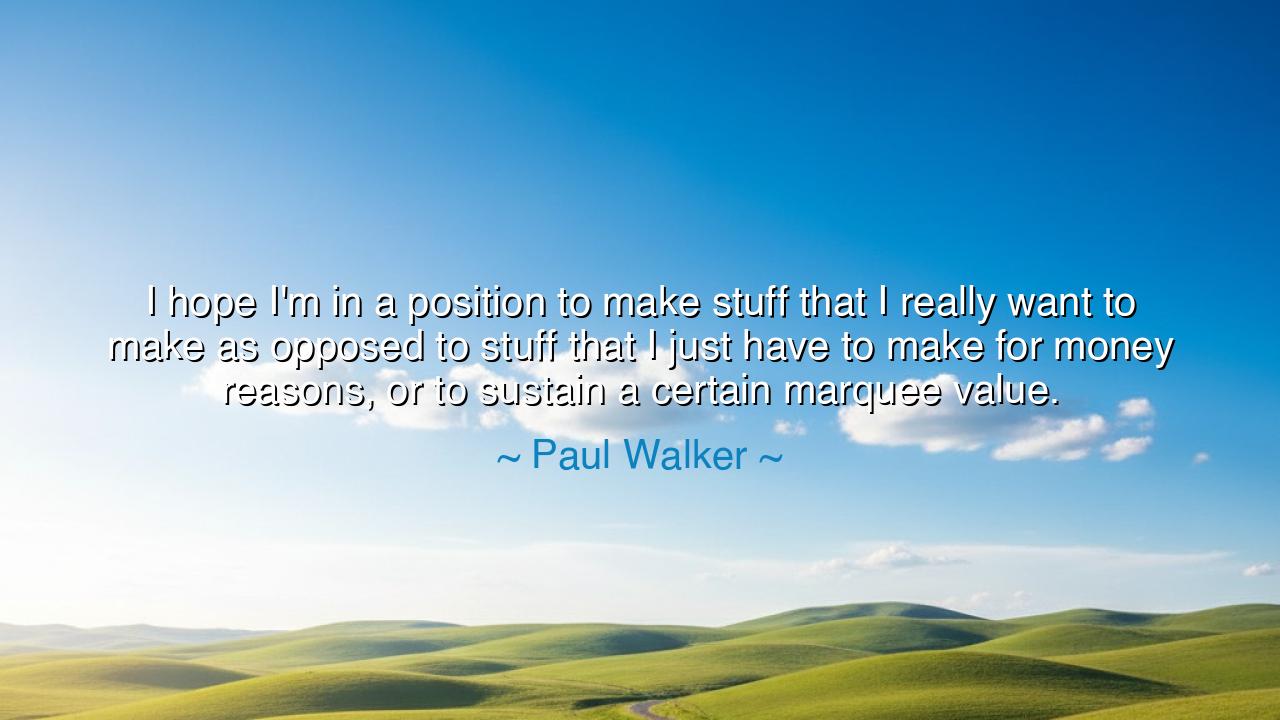
I hope I'm in a position to make stuff that I really want to make
I hope I'm in a position to make stuff that I really want to make as opposed to stuff that I just have to make for money reasons, or to sustain a certain marquee value.






"I hope I'm in a position to make stuff that I really want to make as opposed to stuff that I just have to make for money reasons, or to sustain a certain marquee value." Thus spoke Paul Walker, a man whose fame, though gilded by the bright lights of Hollywood, carried within it a humble longing for truth. In this confession, spoken not from vanity but from sincerity, Walker revealed the timeless struggle of the human spirit—to live by one’s purpose rather than by the weight of necessity. His words are not merely about art or acting; they are a reflection on the soul’s yearning to be free—to create, to give, to live authentically, unbound by the chains of approval or wealth.
At the heart of this saying lies the eternal tension between passion and survival, between what one loves and what one must do to endure. Paul Walker, known to the world for the Fast & Furious films, was more than a star of spectacle and speed; he was a man aware of the fleeting nature of fame. He knew that the applause of the crowd could fade as quickly as it rose, and that true fulfillment could not be found in sustaining a “marquee value,” that fragile measure by which the world esteems its idols. What he desired instead was freedom—the sacred ability to create from the heart, not from obligation. His words remind us that the noblest work springs not from fear of loss, but from the joy of expression.
The ancients knew this truth well. Consider the story of Marcus Aurelius, the philosopher-emperor. Surrounded by power, luxury, and the endless duties of empire, he still wrote in his Meditations that the only true possession a man has is the integrity of his own soul. To act for the world’s favor is to become its slave; to act from one’s inner calling is to become free. So it was with Walker’s hope—to reach a place in life where his choices were ruled not by commerce, but by conviction. In a world obsessed with status and image, his words stand as a quiet rebellion, a declaration that authentic creation is worth more than the glitter of success.
We might also remember Vincent van Gogh, who lived in poverty, painting in obscurity, selling almost nothing in his lifetime. He made not for money, but because he could not do otherwise—his art was the voice of his soul. Though the world ignored him, he followed his passion with unyielding faith. It is men and women like him, and like Walker, who teach us that meaning is richer than wealth, and that to live truly is to align one’s work with one’s heart. Walker’s longing was to live this truth—to find balance between worldly demands and inner purpose.
But this balance is not easily achieved. Every person, in their own way, must wrestle with the same question: Do I labor for what feeds my soul, or for what sustains my image? The modern world demands performance; it rewards the appearance of success over the substance of fulfillment. Yet as Walker understood, to live only for money or reputation is to live half a life—to gain much and still feel empty. True greatness lies not in the height of one’s fame, but in the depth of one’s authenticity. The wise know that joy comes when one’s actions are guided by passion, not pressure.
Walker’s words also speak of hope, that sacred spark which drives all creation. He did not boast of what he had achieved; he yearned for what he might yet become—a man guided by purpose, not necessity. Hope, for him, was not mere wishfulness; it was an act of faith in his own evolution. To “make stuff I really want to make” was his way of saying, I want to live truthfully. This is a universal longing, shared by every artist, teacher, builder, or dreamer who seeks to do work that reflects who they truly are. For when we create with authenticity, we build not for the world’s applause, but for eternity.
So, my listener, let this be your lesson: do not measure your life by the wages it pays, but by the meaning it holds. Earn what you must, but never let gold buy your soul. If your work does not feed your spirit, then it will starve your joy. Like Walker, strive to reach a place where your choices are not governed by survival alone, but by purpose—where what you create, give, or build is born of love, not of fear. For the legacy of a person is not the number of their possessions or the fame of their name, but the truth of their work and the purity of their intent.
And when the world tempts you to act for its praise, remember the wisdom of Paul Walker: that true freedom lies not in maintaining your “marquee value,” but in following the quiet, courageous call of your own heart. Create what is real. Live what is true. For only then will your work—whatever form it takes—become not a transaction, but a testament; not an obligation, but an offering to the divine fire that dwells within all who dare to live authentically.






AAdministratorAdministrator
Welcome, honored guests. Please leave a comment, we will respond soon